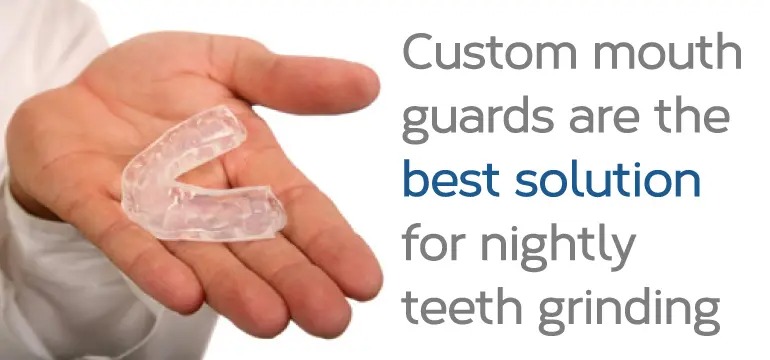You may not be familiar with the term “bruxism,” but you’re undoubtedly familiar with the behavior. Bruxism is the grinding, gnashing, or clenching of teeth. Many of us do it without even realizing; in fact, a lot of people do it in their sleep, which is called sleep bruxism.
Regardless of whether you know the name, it’s important to understand the consequences of bruxism and how it can impact your dental health. Bruxers are found everywhere from Phoenix, AZ to Fairfax, VA, and while there’s no real cure, there are ways of preventing teeth grinding.
Read on to learn more about this condition and how you can lessen and treat bruxism.
What is Bruxism?
Bruxism is a broad term used to encompass a number of behaviors, including:
- Gnashing of teeth
- Grinding of teeth
- Clenching of teeth
- Gritting of teeth
- Any of these behaviors during sleep
Teeth grinding causes may include anything from high stress to abnormal bite to crooked teeth. If bruxism sounds serious, consider this: The masseter, the cheek muscle that helps us chew, is one of the strongest muscles in the entire body. Dental researchers say it can exert up to 600 pounds of force per square inch on the molars in the rear of our mouths. It’s a strong muscle and can have a big impact on jaw and mouth health.
How Many People Have Bruxism?
Bruxism is a very common condition, though there’s some disagreement on how many people are bruxers.
One in three people suffer from bruxism, according to one study, but another puts the number much lower at around eight percent of the population. The condition can range in severity from infrequent clenching to outright mashing; a small number of people, roughly 10 percent of bruxism sufferers, grind so hard their teeth are reduced to nubs, and they eventually need to have reconstructive surgery.

Bruxism can wax and wane over a lifetime. While an estimated 15 percent of kids grind their teeth, that number dips to just three percent when referring to the elderly.
Bruxism is occasionally a complication of another condition. A handful of medications, such as certain anti-anxiety pills, for instance, have side effects that include jaw clenching or teeth gnashing.
Is Teeth Grinding Harmful?
There’s no doubt that there can be harmful effects of teeth grinding. Here’s a look at the potential consequences:
Teeth Grinding Effects
Teeth grinding effects can range from mild annoyances to serious problems that require a dental professional’s attention. The big concern among dentists is bruxism’s cumulative effect: It’s not one day of clenching or gnashing that’s the problem, it’s the years of this behavior that wear down your teeth, sparking the need for serious dental treatment. Side effects include:
- Loosening of teeth from the gums
- Losing of teeth
- Fracturing of teeth
- Wearing away of teeth and enamel
- Receding gums
- Aching jaws
- Recurring headaches
- Tooth pain
- Developing jaw joint disorders
One study found that while the average person’s tooth enamel erodes by about 0.3 millimeters every decade, teeth grinders can wear away 0.2 millimeters in just a couple of years.
Teeth Grinding Effects
Teeth grinding occurs frequently during sleep, and there are a number of sleep conditions tied to this behavior, including sleep apnea. Apnea is a chronic disorder in which sleep is disrupted by pauses in breathing or shallow breaths. The pauses can last more than a minute, and they’re usually followed by a choking sound. The condition is under-diagnosed, because many people don’t realize they have the problem.
Studies have found a high instance of bruxism among those with sleep apnea. Almost a quarter of sleep apnea sufferers also grind their teeth.
Teeth and Jaw Clenching
Teeth clenching and jaw clenching occur when you hold your mouth tightly in the same position, and it can have an ill effect on the jaw muscles. They become sore and tired from overuse, and disorders can arise from long-term clenching. Teeth and jaw clenchers often develop chronic headaches because of the tension in the jaw.
Clenching is most often associated with stress, but it can also be exacerbated by habitual chewing on other things, including gum, pencils, or pens. Bruxers are encouraged to avoid chewing gum or becoming otherwise orally fixated on an object that will worsen their symptoms.
TMJ
TMJ stands for the temporomandibular joint, which connects your skull and your jawbone. It’s the part of the mouth bruxism sufferers clench, and it can lead to TMJ disorders. Not all TMJ disorders are caused by bruxism; arthritis and injuries to the jaw may also lead to pain and chronic symptoms.
Bruxism is a leading culprit in many TMJ disorders. Symptoms may include:
- An aching face or jawline
- Soreness in or near the ear
- Tenderness of the jaw
- Locking of the joint, preventing the opening or closing of the mouth
- Pain while chewing
- Clicking or grating when the mouth is opened
The cause of many TMJ disorders is not clear, but researchers have found women between ages 20 and 40 are most likely to develop a TMJ disorder, although they do not represent a disproportionate number of bruxism sufferers.
Why Do People Grind Their Teeth?
There are a large number of mental and physical teeth grinding causes. Someone who has never had bruxism can develop it at age 40, while a child may have sleep bruxism and later outgrow it. Here’s a look at the causes behind teeth grinding.
Stress and Anxiety
People develop nervous, repetitive conditions during times of high stress that they use to relieve some of their tension. For some, it’s yanking on their hair; for others, it’s nail biting. For many, that tension tamer is grinding teeth. In fact, studies have shown that up to 70 percent of bruxism is triggered by stress. Job troubles spark much of that anxiety, though coping techniques also play a role. A person with a good outlet for their stress, such as exercise or therapy, is less likely to develop bruxism.

Doctors say teeth grinding is part of the natural fight-or-flight mechanism within our body. When we are under stress, our shoulders automatically hunch up, our head moves slightly forward, and our teeth clench. From there, a natural reflex is to grind the teeth together.
Hyperactive Personality
Of course, your personality may also be predisposed to teeth grinding. Hyperactive people, including those with attention deficit/hyperactivity disorder, have a greater incidence of bruxism than the general population.
Reasons behind the tie between hyperactivity and teeth grinding include:
- An excess of nervous energy that is released through teeth grinding or teeth clenching
- Those with ADHD experiencing greater levels of stress, a proven cause of bruxism
Teeth Grinding in Kids
While it’s very common for kids with ADHD to be bruxers, they aren’t the only ones. Kids most commonly gnash, clench, or grind their teeth at night, which can be linked to any number of things, including:
- Mouth breathing at night
- Sleep apnea
- Dental occlusions
- Stress
- Liking the feeling of gnashing the teeth, which turns it into a habit
- Psychological problems
Since many children still have their baby teeth, the grinding may not be an issue a dentist addresses. Even when the child has flattened his or her baby teeth from excessive grinding, those teeth will be lost and adult ones will come in. Many children naturally abandon bruxism as they age and physical or mental problems from their childhood recede.
Teeth Grinding Symptoms
There are as many teeth grinding symptoms as there are snakes in Arizona, which is to say a whole lot. They may include:
- Flat, nubbed, or dull teeth
- Earaches
- Tooth pain
- Chronic pain in the mouth or ear area
- Worn-out tooth enamel
- Damage to insides of cheeks
- Tongue indentations
- Sensitive teeth
- Jaw pain
- Wear spots on teeth
Let’s take an in-depth look at three of these symptoms.
Jaw Pain
Jaw pain results from the clenching and grinding of the teeth, which puts excessive pressure on the joints in your jaw. Jaw pain may be exacerbated by chewing gum or eating tough foods like steak. In extreme cases, a patient may resort to a splint for the jaw, which can help alleviate pain, but splints are not a cure for teeth grinding; the jaw pain usually returns once the splint has been removed.
Tooth Pain
Perhaps the most obvious, and most serious, symptom of teeth grinding is tooth pain. It’s not hard to figure out why this occurs. Teeth are not built to withstand the extreme pressure that bruxers put on them. Grinding of teeth applies the same force you’d need to crack a walnut, and teeth cannot stay healthy in the long run when exposed to that pressure every day.
Grinding can lead to small fissures or fractures in the tooth, which causes pain when the teeth are used for chewing. Sensitivity can develop, because bruxism wears away the enamel that protects the teeth from extreme temperatures, and grinding can wear down teeth, making it difficult and painful to eat.
Wear Spots on Teeth
Wear spots are places on your teeth where the enamel has worn away and the layer underneath, called dentin, begins to fade as well. Dentists keep an eye out for these spots, because they’re an indicator of teeth grinding or clenching. Teeth may become more sensitive when these wear spots develop, because they are less protected without the layers of enamel.
How to Stop Grinding Your Teeth at Night
Once bruxers have identified the problem, many wonder how to stop teeth grinding. There’s no one solution, but there are a number of treatments and medical options that can help manage the problem while preventing further damage to the teeth.
Bruxism Treatment
There are two forms of bruxism treatment. One tends to the symptoms of the disorder, while the other treats the disorder itself, trying to lessen occurrence of symptoms.
Treatments for teeth grinding symptoms aimed at alleviating soreness and tooth pain include:
- Using a warm, wet washcloth on the jaw
- Massaging jaw muscles, the neck, and face to relieve tension on trigger points
- Getting physical therapy
- Doing exercises to relax the jaw
- Visiting a chiropractor
- Using muscle relaxants to relax the jaw
Treatments for bruxism designed to reduce symptoms or get rid of teeth grinding altogether include:
- Reducing stress
- Drinking more water
- Getting more sleep
- Not chewing gum or on other objects
- Consciously relaxing the face and jaw throughout the day
- Buying a teeth grinding mouth guard
- Avoiding alcohol, which increases the urge to clench the teeth
- Avoiding caffeine, which can make you jumpy and tense
The most popular and widely used of these solutions is mouth guards.
Custom Night Guards

Night guards are mouth guards that are worn at night to guard against teeth grinding. They are different from mouth guards worn during athletics. The idea is that people will continue to grind their teeth at night, but by using a mouth guard, they avoid damaging their teeth, because the guard takes the brunt of the grinding.
There are two types of night guards. The first is a custom night guard made by a dentist, who will measure your mouth and teeth and build a guard to those specifications. That guard cannot be used by anyone else, because it will not fit properly. Custom night guards are often the smarter choice in protecting against bruxism, because they account for your unique mouth shape and circumstances.
You can also buy a non-custom night guard at a drug store. These may fit less comfortably, because they aren’t designed with your mouth in mind. Still, they shield the teeth from the worst of the night grinding.
Some dentists even recommend night guards for people who do not currently suffer from bruxism, as these guards protect the mouth from any sort of night trauma. They view the guards as insurance for your dental work.
Jaw Exercises
Another way to treat teeth grinding is to do daily jaw exercises. A physical therapist or chiropractor can recommend more specialized exercises, but here are a few to start with that will help relax and strengthen your jaw – perform each exercise three to six times, two or three times a day:
- Using a warm, wet washcloth on the jaw
- Place your thumb underneath your chin; open and close the mouth while keeping your thumb in place
- Put your thumb and forefinger on the front of your chin; push your jaw out so that your hand moves forward
- Put your tongue on the roof of your mouth and open and close
- Position a finger just inside your mouth; let your jaw go slack
Bruxism Treatment and Beyond
There is no cure for bruxism, but it can be managed. By using a custom night guard, employing pain management tactics, and strengthening the jaw with exercises, bruxers can lessen their symptoms and avoid major dental work.
If you are interested in getting an estimate on custom night guards to help stop teeth grinding, contact AZ Family Dental in Glendale, Arizona today.
